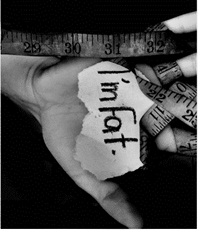Using Affirmations to Stop Overeating
Part 8: Using Affirmations
 Affirmations are an important aspect of success in ending a lifetime of overeating and many other unwanted behaviors.
Affirmations are an important aspect of success in ending a lifetime of overeating and many other unwanted behaviors.
A full month of following a new behavior is necessary to begin to establish new patterns and change a habit or mindset.
The new affirmation behavior in your Triumphant Journey is to say selected affirmations out loud three times every morning.
Repeating personally relevant affirmations on a regular basis for a month can help free your mind of negative thinking. Your thinking and sense of yourself can then begin to grow and expand in a healthy creative way. Stating affirmations can also help you accept your continually developing strengths and self-knowledge.
This section contains 134 affirmations. Choose which ideas seem most appropriate for you.
Choose affirmations if after reading them you think:
- "If I really believed that, my life would be a lot better."
- "I wish my life were like that."
- "That's too good to be true."
Method: Choose one, three or five affirmations.
Read them out loud every morning three times.
- 1) Read out loud once as you stand in one place. This prepares your inner self to receive the affirmation.
- 2) Read out loud once as you walk around a room or outdoor area. This helps ground the meaning into your body and also makes the thought and feeling familiar and comfortable in particular and different environments.
- 3) Read out loud once in front of a mirror, looking at your reflection as you speak.This helps you see yourself listening and helps you accept the strength and awareness you are giving yourself.
Do this every morning for one month.
At the end of one month, add new affirmations to you list. You may subtract any affirmations you did the preceding month. Or, you may continue on with any of them. You will have a sense of what you need to do as you become engaged in the process.
Here is a list of 134 affirmations from which to choose. Feel free to add to your personal list at any time.
Affirmations
Know Thyself - Nothing in Excess
1. I happily nourish my body and receive full satisfaction from moderate meals daily.
2. I welcome all my feelings knowing they guide me to my true self.
3. I deserve love and respect as I am.
4. I enjoy excellent health.
5. I have abundant energy.
6. I enjoy the colors, smells, and feel of life around me.
7. I am confident in the workings of my mind.
8. I am trustworthy. I can rely on me.
9. I say "yes" only when I mean it.
10. I say "no" when I feel it and mean it.
11. I am efficient and creative in my work.
12. I have ample time to relax and enjoy life.
13. I am lovable.
14. I delight in learning. I take classes and read books on subjects new to me.
15. I invite friends to join me in simple pleasures.
16. I read aloud from my Triumpant Journey Journal and accept all my experiences as valid.
17. I learn more about my value and inner life every day.
18. I honor my mind, my body and my spirit every day.
19. I give myself respect and encouragement to grow as a kind and loving person.
20. I stand up for what I believe.
21. I am honest to myself and other people.
22. I know how to care for myself.
23. I can forgive.
24. I can love.
25. I am free.
26. I am getting better and better in every way.
27. Creativity is a blessing I accept.
28. I am generous with my creativity, myself and others.
29. I tolerate my feelings, think, decide and then act or not act in the best interest of all concerned, caring for myself and my loved ones.
30. I accept God/Goddess's help unfolding my life.
31. Courage unifies me.
32. I know what I know.
33. I shift from a limiting mental state to a limitless mental state easily and consistently.
34. I can find peace in myself.
35. I know when to let go and move on.
36. I explore where my creativity and bliss lead me.
37. I use anxiety to create.
38. I get adequate rest, exercise and nourishment.
39. I love my firends and family.
40. My friends and family love me.
Affirmations 41 - 134
41. Timely right action and correct conduct are my only true protection.
42. I attract large sums of money.
43. I stay on task: new tasks and old tasks.
44. I attract healthy, honest people into my life.
45. I am grateful to God/Goddess and people.
46. I am glad to be healthy and alive.
47. I exult in the success of others.
48. I keep my word to others.
49. I am handsome.
50. I keep my word to myself.
51. I expect the best.
52. I contribute to the happiness of others.
53. I follow through.
54. I ask for what I want.
55. I help others fulfill their goals.
56. I honor my integrity and the integrity of others.
57. I say clearly and wholeheartedly my yes and no.
58. I accept other people's way of using their personally developed healing and sustaining tools.
59. I accept others as they are.
60. I love.
61. I am thriving. The best is here for me to call into existence now.
62. I turn knowledge into positive action.
63. I share my goals.
64. I find my learning.
65. I share my tasks.
66. I share my dreams.
67. I let others help.
68. I am adult.
69. I am open
70. I let others know my life.
71. I let others in my life.
72. I tolerate others' anger and disappointment. I maintain the relationshiop and my course of action.
73. I create opportunities.
74. Wherever possible I turn negatives into positives.
75. I am glad to be publicly accountable.
76. I stay on task.
77. I am paid very well in money and respect.
78. I am lean, sexy and strong.
79. I am willing to succeed.
80. I believe my deep knowing.
81. I offer what I know in terms people can understand.
82. I am beautiful.
83. People are glad to be with me.
84. I attend to practical, concrete matters.
85. I make amends as soon as possible.
86. I make amends promptly with a steady presence.
87. I take timely right action and engage in correct conduct.
88. I live in an endless sequences of now moments.
89. I discard outmoded relationships including outmoded relaltionships with myself.
90. I create my future in now moments.
91. I am careful to honor my schedule and responsibilites.
92. I am clear amd calm.
93. People in my life are present for our mututal learning.
94. I treat humiliation as a teacher that helps me get my priorities straight - friends, family, community.
95. I follow up on my projecgts.
96. I interact with new people.
97. I succeed where I put my efforts.
98. I think the thoughts that will produce happiness in this situation.
99. I manage large and small sums of money well.
100. I speak what I know from my heart.
101. I trust people to be here for me.
102. People are glad to support me.
103. People are glad to love me.
104. People are glad to give me what I need.
105. People are glad to accept me.
106. People are glad to pay me.
107. I am smart.
108. I am creative.
109. I am desirable.
110. I am quick-witted.
111. I am healthy.
112. I am a good age to be.
113. I am attractive.
114. I take adequate action.
115. I am strong and calm.
116. I am playful and competent.
117. I am humble.
118. I care for myself.
119. I am finding my way in this new world.
120. I am creating opportunity.
121. I am winning by doing this exercise.
122. I am getting better and better in every way.
123. I forgive everyone I believe has wronged me.
124. I am temperate and courteous.
125. I forgive myself for all the hurts I have inflicted on myself.
126. I am open to receive and welcome love.
127. I am open to receive, welcome and return committed love.
128. I am creating a solid career that brings joy and satisfaction to me and the people I serve.
129. I contain my feelings, and think about what I am feeling and doing.
130. I am rooted in the soil of right action.
131. I deserve only success.
132. I am healthy.
133. I am prosperous and happy.
134. I breathe, enjoy, am honest, listen, learn, ask for what I want, follow my bliss and my honor. The rest unfolds as it is.
end of part 8
next: Part Nine: Forms Of Help Beyond Triumphant Journey Cyberguide
~ all triumphant journey articles
~ eating disorders library
~ all articles on eating disorders
APA Reference
Staff, H.
(2008, November 22). Using Affirmations to Stop Overeating, HealthyPlace. Retrieved
on 2026, January 13 from https://www.healthyplace.com/eating-disorders/articles/using-affirmations-to-stop-overeating
 Women have related intimately with food since time began, as feeders and nurturers, harvesters, gatherers, and cooks. But in recent decades, this relationship has grown troubled. It can be said, in fact, that very few women today feel completely comfortable with food, eating, and the bodies their diets should nourish. Research has confirmed what any of us could have guessed - it actually is the norm in this country for women to be dissatisfied with their bodies, to worry about how much they eat, and to believe they should be dieting. What does this mean, and can we change it?
Women have related intimately with food since time began, as feeders and nurturers, harvesters, gatherers, and cooks. But in recent decades, this relationship has grown troubled. It can be said, in fact, that very few women today feel completely comfortable with food, eating, and the bodies their diets should nourish. Research has confirmed what any of us could have guessed - it actually is the norm in this country for women to be dissatisfied with their bodies, to worry about how much they eat, and to believe they should be dieting. What does this mean, and can we change it? Anorexia Nervosa is a condition in which a person literally starves the body of the nutrients it needs. People with anorexia often claim they are not hungry, strive to eat very little (even to the point of counting out flakes of cereal or individual grapes), and have an exaggerated, irrational fear of becoming fat. The fear of fat exists despite actual body size; in fact, the person afflicted may be very skinny or even skeletal. To be diagnosed with anorexia, one must be 15% below normal weight.
Anorexia Nervosa is a condition in which a person literally starves the body of the nutrients it needs. People with anorexia often claim they are not hungry, strive to eat very little (even to the point of counting out flakes of cereal or individual grapes), and have an exaggerated, irrational fear of becoming fat. The fear of fat exists despite actual body size; in fact, the person afflicted may be very skinny or even skeletal. To be diagnosed with anorexia, one must be 15% below normal weight. In 1991, I was cohosting a radio talk show concerning health issues with Tamiko in Beverly Hills, California. She asked me to write a brief "Ten Tips to Stop Overeating" that we could offer our listeners. Her idea was a card that people could tack on a refrigerator door.
In 1991, I was cohosting a radio talk show concerning health issues with Tamiko in Beverly Hills, California. She asked me to write a brief "Ten Tips to Stop Overeating" that we could offer our listeners. Her idea was a card that people could tack on a refrigerator door. Treating a delinquent teen alongside like-minded youths is the norm, but it may exacerbate conduct disorders, according to Jose Szapocznik, Ph.D., professor of psychiatry and behavioral sciences at the University of Miami School of Medicine. "When kids are alone together, they court each other's anti-social behavior. 'I smoke marijuana,' says one kid. The other says, 'That's great: I know where to buy it.'"
Treating a delinquent teen alongside like-minded youths is the norm, but it may exacerbate conduct disorders, according to Jose Szapocznik, Ph.D., professor of psychiatry and behavioral sciences at the University of Miami School of Medicine. "When kids are alone together, they court each other's anti-social behavior. 'I smoke marijuana,' says one kid. The other says, 'That's great: I know where to buy it.'"